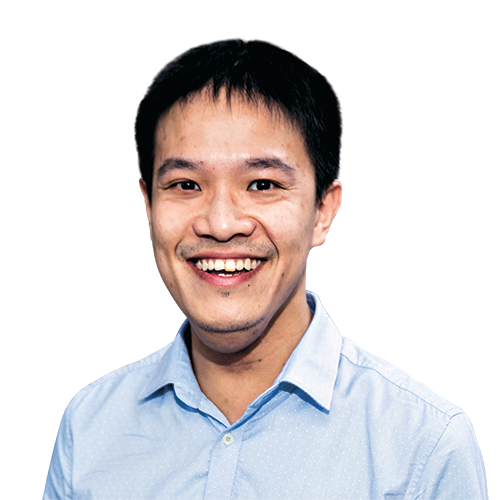The Paper Chase: Was It All Worth It?
A ticket to employment. A safety net. A social leveller. Just what is the value of a degree today? Five of our alumni discuss.
Making the Grade
There was a time when a university degree guaranteed career and social advancement. But with today’s changing socio-economic realities, there appear to be other paths to success. Is it time to ‘re-qualify’ the value of qualifications — especially with rising graduate numbers — or do age-old beliefs about the power of academic credentials still hold true?
OUR PANEL

Ms Cherie Tan
(Engineering ’12)
31, National bowler

Mr Xeo Lye
(Business ’03)
41, Boardgame producer

Ms Ayushi Bainwala
(Arts and Social Sciences ’18)
25, Financial analyst

Mr Jeffrey Nah
(EMBA ’15)
65, Venture capitalist

Mr Dennis Kwa
(Engineering ’13)
31, Electrical engineer
How relevant has a degree proven to your career?
Cherie Tan: What I did in university has no relevance to my career as a national bowler. (Ed: Ms Tan was named World Bowling Athlete of the Year 2019 by the World Bowling Association, the first Singaporean to receive this honour) I started bowling when I was about 10 and have always been passionate about it. So, why did I choose to do a degree? Well, this is Singapore! I needed a fall-back plan in case bowling didn’t work out. I chose a degree in Material Science because it has some relevance to the sport I play – I can make bowling balls (laughs)! I was fortunate that NUS has a flexible scheme that allowed me to juggle both sporting and academic commitments – I got to defer a few semesters and graduated two years later than my peers, and my professors would even give me one-on-one lessons to help me catch up.
Xeo Lye: I was previously in wealth management, writing books and giving talks on the topic. One of my Malaysian clients wanted to start investment clubs in the universities, and asked us to create a boardgame for them — that was the beginning of our game design and development studio (Capital Gains Studio, which specialises in finance-themed games). My marketing training at NUS Business School helped [in the business development for my own company], but as undergraduates, we were trained to come up with marketing plans for big companies with big budgets. It is a different challenge when you are a small start-up promoting an unknown brand.
Ayushi Bainwala: People in finance have a saying: “An investment in knowledge pays the best interest.” My Master of Economics degree from NUS is especially valuable to me since I always knew I wanted to work in finance. While the Bachelor’s degree programme I did [in India] was largely theory-based, my Master’s course on Applied Economics was more hands-on with seminars, presentations and project work. I had the opportunity to be exposed to different areas of specialisation during the course, trying my hand at asset management, research, trade finance… all through on- and off-campus projects. I could also take courses from other schools, such as Big Data Analytics, and this expanded my field of knowledge. The classes being held in the evenings also meant that I could work a few days per week. Though that meant that college life was a crazy, hectic rollercoaster, I wanted to seize all the learning opportunities I could get during this time of exploration.
Jeffrey Nah: When I took my EMBA eight years ago, at the age of 57, the professor asked me why I wanted to do the course. The average age of my coursemates was 40 – and the youngest was only 30 years old. In fact, most of the professors were younger than me! But I am a banker-turned-entrepreneur, and at that point, I was switching again to become an investor – and the finance knowledge I had was from 30 years ago. I needed to continue learning to switch to different sides of the industry.
Dennis Kwa: I do work in the same field as my area of study, but what I find more valuable than the knowledge gained during the course, are things like independence and lifelong learning skills. When I was on a student exchange in Stuttgart, Germany, I experienced a different education system where — while one needed to register to download course materials — the lectures are free to the public. Everyone and anyone is free to listen in, and even sign up for exams! That made me think about my own style of learning. Upon returning to NUS, I started to attend lectures for a course that I didn’t enrol in, and the professor was happy to have me too. Though I eventually burned out because it was just too taxing on my schedule, the experience made me learn not to simply do what is “popular”, but focus on things that are important to my areas of interest.
What then, to you, is the true “value” of your degree?
Ayushi: One’s perception of the value of a degree changes with time. When you get your first job upon graduation, you are super-thankful for the degree, for you see it as what has gotten you employed. But as you progress in your career, you will rely less and less on your qualifications and more on your different skill sets. Thus, your perceived value of the degree might diminish. However, this doesn’t mean that what you learned in university is less important, for the experiences gained during project work, and the life skills that you developed in the course of your study, all make you who you are today.
Cherie: For me, the value of my education at NUS lies more in the life skills learned: discipline, time management, and learning how to prioritise my tasks.
Xeo: When my company was expanding beyond Singapore, I also had to figure out a lot of things – from negotiation techniques in different cultures, and licensing and copyright matters to even writing press releases – that are not taught in the textbooks. That said, the network of people I knew through studying in NUS – those specialising in logistics, brand management and communications – proved an invaluable resource. I tapped into their respective expertise to help myself and my company grow.
Jeffrey: The EMBA was a joint UCLA-NUS EMBA programme and networking with the UCLA alumni was very profitable for me – over the years, I have formed numerous business partnerships with members of the alumni. But what is the true value of higher education? It is to develop the soft skills of communicating, assimilating, adapting, aggregating and to be agile. This is especially important in these volatile times, and when the world is becoming smaller – I have lived and worked in seven different countries and can tell you that industry knowledge and intelligence is not enough. So, I encourage all current students to reframe and retrain their mind: to think about education not just as a means to a job, but an opportunity to develop your competencies and skills to the fullest, so that you will be able to navigate the uncertainties of the future.
Do you agree that a degree today doesn’t guarantee you a job?
Think about education not just as a means to a job, but an opportunity to develop your competencies and skills to the fullest, so that you will be able to navigate the uncertainties of the future. Mr Jeffrey Nah
Dennis: We all have peers who did not manage to find work. But sometimes it’s also about the person’s expectations. Indeed, one is considered the top 20 per cent of the population if one has a degree, and that could lead to high expectations: some of my younger peers even expect a $5K starting pay!
Xeo: Junior college students still pick university courses based on what jobs pay the best at the point of enrolment. Naturally they will graduate with certain expectations.
Ayushi: That you are certified in a certain course serves as an indication of your minimum industry knowledge to others – and a degree is a globally-recognised qualification that can open doors. However, prospective employers will only understand you as a person when they interact with you, and so, how you put yourself out there becomes very important too. Also, a lot of times these days, one needs job experience to even apply for a job. So, you need to be quick with getting your internships before graduating and gain relevant work experience to give you an edge. A lot of my juniors are also confused as to what they should pursue, and I tell them that they should think three to five years ahead. Yet that is challenging because you cannot predict what the market wants at the point of your graduation.
Jeffrey: The McKinsey Global Institute predicted that 800 million jobs will be lost globally by 2030 (and be replaced by robotic automation) – the future is a big uncertainty to navigate, and to be kiasu and kiasi (conservative because of a fear of risks and failure) is completely contrarian to these times. That degree-holders are not finding jobs – and this is a global issue – could be a supply-and-demand problem. But it could also be the result of a disconnect between the academic institutions and the market. Academia has traditionally operated as silos – with different faculties operating independently, but the real world isn’t like that. That said, I do see universities adapting and changing their approach. So they are shaping graduates to be more multi-disciplined, yet with a specialised skill. The education system has realised its function is not in just the imparting of information — for things are changing so quickly that information gets redundant and irrelevant quickly. The best thing they can impart to students are tools to help them be future-proof. Everybody needs entrepreneurial skills: you have to seize the opportunities yourself, and use your education to maximise what you want to develop.
300 MILLION
The expected number of young people aged 24 to 34 completing a tertiary degree across OECD and G20 countries by 2030, up from 137 million in 2013.
Source: “Benchmarking Higher Education System Performance” report, OECD
If degrees do not guarantee jobs, do you think higher education still serves its function as a “social leveller”?
Make use not just of the opportunities your university presents you, but also the resources provided by the school — from mentorship and guidance, to facilities and even grants to start a business. Mr Xeo Lye
Ayushi: I had a diverse mix of classmates in the public university I attended in India: some lived in the city, and others had to travel two to three hours by train just to get to school. Often we think that getting into university and financing it is a challenge for those from low-income backgrounds, but our university provided equal opportunity for all: my monthly tuition fee was all of two dollars! This access to education means your success is dependent on your dedication, and how interested you are in changing your life with it – and I have many coursemates who have landed good jobs, and others have gone on to do PhD programmes in the US.
Dennis: I see university as a social leveller still, even in Singapore. At any other level of education, those who are more well-off can give themselves an edge by forking out money for tuition and enrichment classes outside of school. But in university, you have to depend on yourself – you can at best do your own studying to give yourself a headstart, but everybody starts on the same plane, especially in years Three and Four, when the subjects are completely new to all. It trains you to find your own edge based on your skills, which is important, for while the world is your playground when you graduate, you will also find the world challenging you for your job.
LEARN TO EARN

The median gross monthly salary among fresh graduates in full-time permanent employment was slightly higher than $3,500 in 2018 to about
$3,600 in 2019
Information and Digital Technologies graduates commanded the highest median starting salaries at
$4,400
Source: Joint Graduate Employment Survey 2019
If you were an 18 year-old today, would you choose to do a degree course?
Cherie: I go for what I want and don’t really listen to what others say, so I might not have — especially since bowling as a career has a much longer lifespan than other sports, and one can keep at it until 50 or even 60 years of age. I tried out a lot of things while I was younger, such as different sports and music, and found bowling to be my passion: my goal has always been to win at the bowling World Championships. In fact, I was at a crossroads after graduating from Mechanical Engineering and considered pursuing further studies at Duke-NUS Medical School. Though I was accepted, I eventually still chose bowling full-time and took up the Sport Excellence Scholarship (spexScholarship) which was introduced in 2013. Though I am not usually swayed by the opinions of others, I should also stress that my parents have always been supportive of my decisions – that really helped in my pursuit.
Xeo: The more conservative parents would probably be less open to different paths, and would like their children to pursue a university education. Your family’s financial situation greatly influences the risks you take.
Aushi: My parents are not so traditional, but they still believe in the opportunities education can present. They see it as a something that empowers you – be it to get a job or create a job. They believe in the concept of learning leading to independence.
Jeffrey: My 24 year-old son is doing his degree now, but I let him choose his own path – I did not insist that he attend university, for while a university education is helpful, it is not critical. And if you are at it, maximise the learning opportunity that it affords you: do internships, go for exchanges, go out and get dirty. Frankly, this mentality should be cultivated even earlier, in secondary schools and junior colleges.
Dennis: Some people used to joke that ITE stands for “It’s The End”, but in my company, I have bosses who went to ITE, and then worked their way towards a diploma, degree and even a PhD. Yes, scholars might be put on a fast-track for promotion in some statutory boards, but after the first three to five years in your job, it is your work, attitude and passion that will carry you forward.
Cherie: The young people today are also shifting their ambitions: many want to be YouTubers – which you don’t need a degree for.
Jeffrey: Everything is tied to the bigger social mindset – what we need to address is whether the Singaporean mindset is evolving fast enough to catch up with the rest of the world.
What advice will you give to young graduates today?
Ayushi: Put yourself out there. You have to take the first step to get noticed, or even get help. And don’t be afraid to ask for mentorship or help.
Xeo: Make use of the opportunities your university presents you, and also the resources it provides – from guidance to facilities and even grants to start a business. Many big companies today were created while the founders were undergraduates, and NUS has a lot of resources that support young entrepreneurs.
Jeffrey: Cherie identified her passion and purpose, kept at it until she excelled, and then applied it to a career that the world needs, and would pay for. And this is exactly what I always emphasise: passion, purpose, and to persevere until you perform.
Dennis: Take the analogy of a supermarket: you walk in and choose which lane you want to go – which is like picking your course. You then pick up what you need for your task, be it ingredients for cooking or
tools for a DIY project – these are like the modules you choose. Your passion is the task that defines your shopping list, and if you don’t focus on it, you might get distracted and buy things that are irrelevant. When you leave the supermarket with the goods, it is up to you to use the tools to achieve your goal. You might even realise that you need other things, and return to the supermarket to pick up other items which you didn’t realise you needed earlier on. The point of this analogy is that what you get out of your university education is up to you, as is how you use it to meet your own goals.
If you’d like to join our Forum panel, do write to us at OARconnect@nus.edu.sg to express your interest and pick from our list of future discussion topics that you may want to be part of.
Text by Koh Yuen Lin. Photos by Wilson Pang